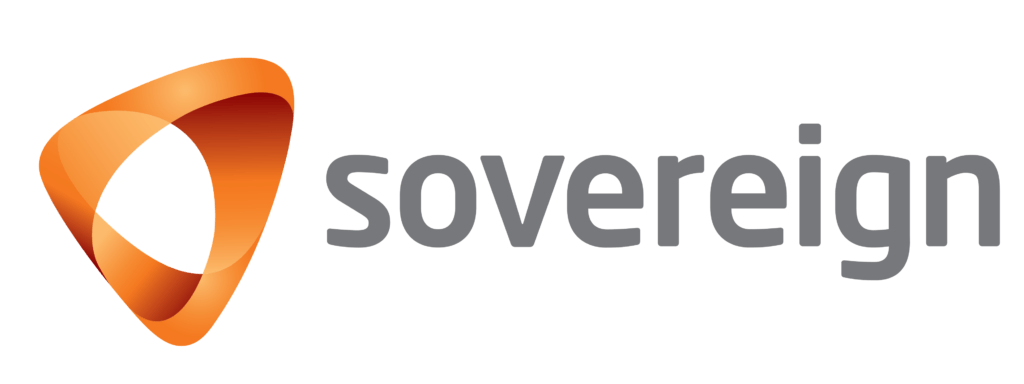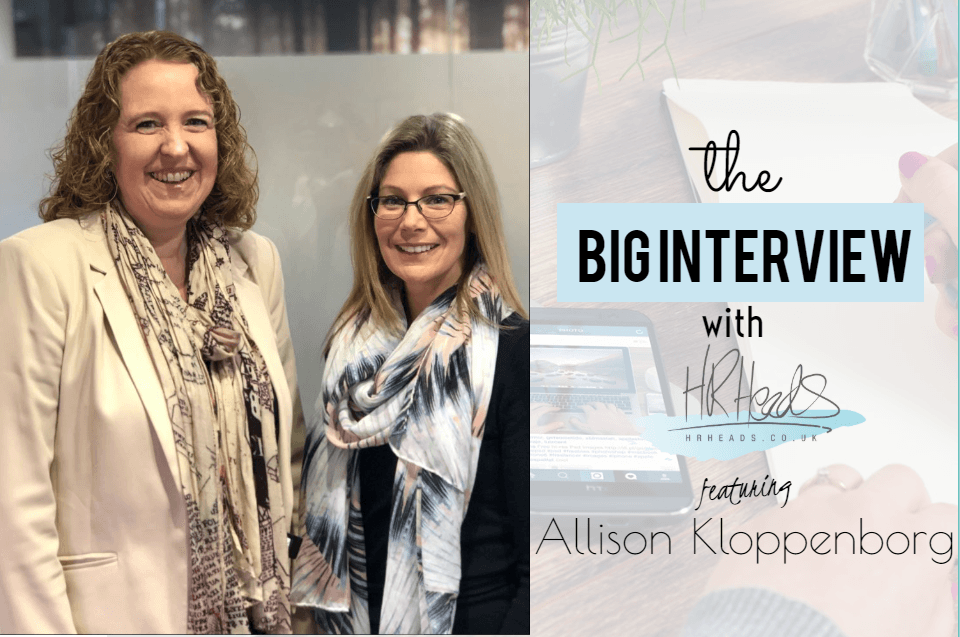The HR Heads Career Profile Series, The Big Interview, launched in 2017. We speak with senior HR Leaders within our network to find out what 'a typical day in the office' looks like, what they consider their greatest career success to be, the advice they'd give their 20 year old self and the essential skills required to hold a senior HR position.

Allison Kloppenborg, Head of HR at Sovereign Housing Association
How did you get into HR in the first place?
I had no idea what I wanted to do as a career, and I probably fell into HR as a result. During university, I found both the Psychology and Industrial Sociology modules interesting and it was during my postgraduate studies that my first HR opportunity arose, so I gladly accepted. I worked for South African Railway Services for a year in a role titled ‘Manpower Consultant’. It was a very structured environment, with a sentiment that HR were ‘police’ – almost to the point where if people misbehaved, they got sent to HR. I remember thinking to myself; if this is what HR is about, it’s not for me! I moved to a role in a progressive development organisation growing my HR skills and expertise.
How did you progress to Head of HR, and did you specialise on the way?
I haven’t specialised, I’ve deliberately kept myself within HR Generalist roles so that I keep all aspects of my knowledge up to date. I spent 20 years in South Africa and on seeking permanent work in the UK (and my first role with Sovereign!) I specialised for a short while in a learning and development role, with a view to establishing Investors in People (IiP) accreditation for the organisation. At the time, they had no training function, and it was one of my first jobs to establish one. However, my role quickly moved back to a generalist one as I picked up wider responsibility for a breadth of HR activity.
How different was your HR role in South Africa, compared to dealing with a broader HR role in the UK with Sovereign?
It was quite different, and not how most people expect it to be! In South Africa, Human Resources was heavily American led and was a very forward-thinking function, so some of our strategies were not yet part of HR in the UK. When I first got here, it did feel like a step backwards in terms of my previous roles in HR in South Africa.
What does a typical day look like for you?
I don’t think there is such a thing! We’re a large organisation now; we have 2,000 employees and a reasonably sizes HR team. Because of our size, we have two Heads of HR and we split the organisational responsibility between us. I look after the Chief Operating Officer’s department as well as Development and Commercial, and I am part of their Senior Leadership Team. I have a team of Business Partners and Advisors that report into me, and so my days can consist of a variety of different meeting topics; grad schemes, implementation of our new people strategy, discussion of employee relations matters and various team meetings in between.
What do you love about your role?
It’s the variety. We’re an organisation with huge aspirations, so it’s an exciting time at the moment with lots going on – we’re very forward-focused! We’re looking to grow, with aspirations to grow beyond the 57,000 homes we currently have. There were only 5,000 properties when I joined so you can imagine how different the organisation feels now.
Are you geographically spread to achieve that or is there a greater concentration here?
We geographically spread a little during our last merger, which was with Spectrum Housing which was largely based in the south. We are spreading eastwards now, but we have always recognised that there’s real value in keeping our geography as tight as we can, in order to continue to offer great service to all of our residents.
What’s at the heart of Sovereign as a business?
Our Chief Executive recently shared the aspiration ‘If people want a home, we want it to be a Sovereign home,” whether that’s to rent or to buy. At Sovereign, we go beyond just providing a house, we build neighbourhoods and communities too.
I’ve seen how hard it is to afford properties these days, I’ve seen my own daughter struggle. But I’ve also seen how life changing it is when you realise that you can get somewhere with organisations like Sovereign offering support through offers such as shared ownership. Sovereign has also maintained its social rent properties, and aims to build 1,900 affordable rent properties a year by 2022. I’m proud to be part of facilitating that process for so many people.

Looking ahead to the next 12 months, there’s obviously an ambition to grow the business, but what specifically is on your HR agenda?
Given that we’re now an amalgamation of two organisations we’ve worked hard to align ourselves into a single approach. We’re at the cusp of a new people strategy that encompasses how we recruit, our employee value proposition, employee well-being and recognition, to mention just a few aspects of it – so there’s a lot of activity HR-wise. One of the biggest projects over the next 12 months will be our workplace strategy. We have 20 office bases now as a result of all the mergers that have taken place – and our goal is to centralise these to seven. We’ve changed a lot over the years, but this change will feel much more personal for some. Even moving an office ten miles can have a huge impact on some of our employees, so we need to make people impact a priority consideration and be flexible where we can.
What is your proudest career moment?
Following our merger two years ago we brought together two organisations that had completely different sets of terms and conditions, handbooks and approaches, and I led a project last year that harmonised our terms and conditions (T&Cs) and created a process centred around recognising and rewarding people. We introduced it to the employees by way of agreement, asking them to agree to a new set of T&Cs and a new contract of employment with us. As a result of this approach, we achieved 100% acceptance and are continuing to grow that set of terms and conditions into a flexible benefits package.
If you were to go back and talk to 20-year-old Allison, what would you tell yourself?
To trust your instincts. You’ve probably gone into HR because you’ve got some people instincts, so trust them. A lot of your HR activity will be based on reading people, and you’ll need to identify how employees are likely to respond to business decisions and take a lead from this in terms of planning and delivery.
If somebody was thinking about pursuing a career in HR, what tips would you give them to be successful?
Firstly, I’d say think carefully about why you are interested in HR and do some research. Some people come into HR with a slightly skewed vision of what it is. HR is about business: enabling a business to get the best out of its people. It’s not always about comfort and support and it’s easy to become disillusioned. Of course, we must ensure that all our employees are treated well and fairly, but equally there can be some really tough decisions you have to make around people.
Is there anything you’re passionate about championing in HR?
Part of what’s coming up on my agenda is well-being. We’ve given sporadic attention to it in the past, and I could give you countless examples of things we do to contribute to employee’s well-being, but I don’t think we’ve done enough with a comprehensive approach. A large part of that is financial well-being – we need to provide mechanisms to support and enable people to manage their finances effectively. These days, organisations pay decent wages, along with other benefits and maybe even bonuses – but chances are there are a good 20% of our employees who are really struggling financially! How can we help them and ensure they get the support that they need?
We’re an organisation that faces outwards, providing a lot of support for our residents. It’s imperative we spend some more energy focusing inwards to ensure our employees are in the right place to support our residents.
What skills do you consider to be essential to be an HR leader?
Listening – but really listening. Hear what people are saying – study their body language and hear what they’re really telling you (and not saying)
Commercial awareness – as a HR professional you are there to help the business achieve its goals so it’s important to really understand the organisation you’re working within.
Learning – keep updating yourself. Legislation, technology, employees – they’re always changing. You need to keep relevant and focus forward, looking ahead to analyse what the future business needs will be.
Flexibility – be open to change and be flexible on the ways you will deliver a HR service as a result.
_
Get to know Allison
What do you like to do in your spare time?
I love to travel. I’ve just come back from a couple of weeks in Thailand with the family – there were 17 of us that travelled from far and wide to celebrate my Father’s 80th birthday! Family is very important to me. I also have a couple of dogs and a young granddaughter who visits me often so I am kept busy.
What about cuisine? Do you have a favourite?
Oh, definitely seafood.
Do you have a favourite book, or something you’d recommend?
I tend to read psychological thrillers. My children have come to learn – if there’s blood on the cover then mum will probably read it!
If you’d like to be involved in ‘The Big Interview’ series, please reach out to us – we’d love to hear from you!
T: 01962432001 | E: speaktous@hrheads.co.uk

